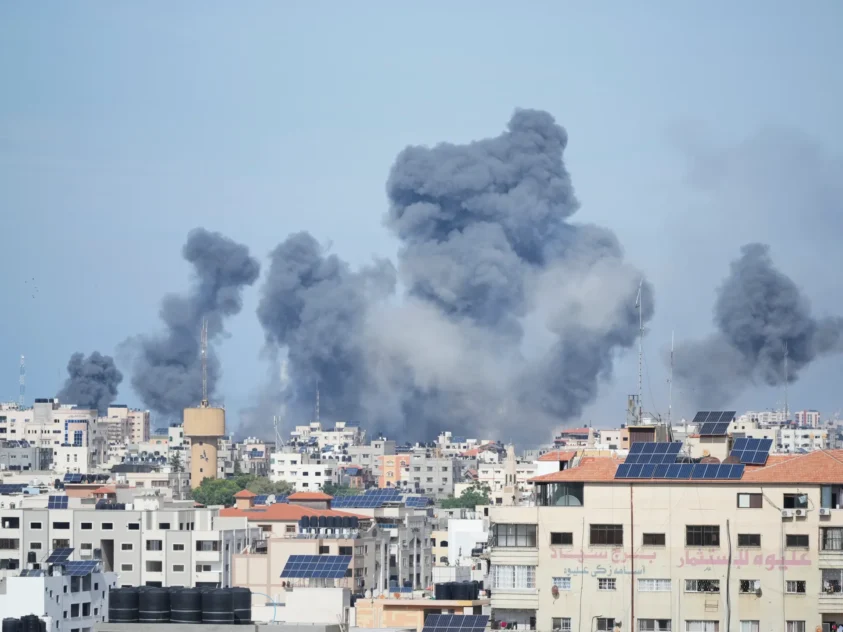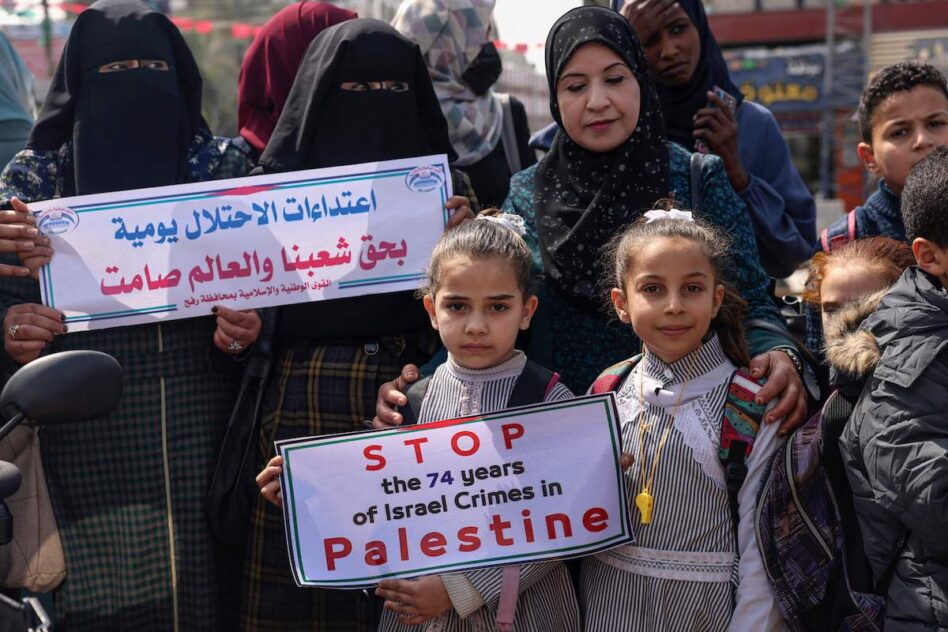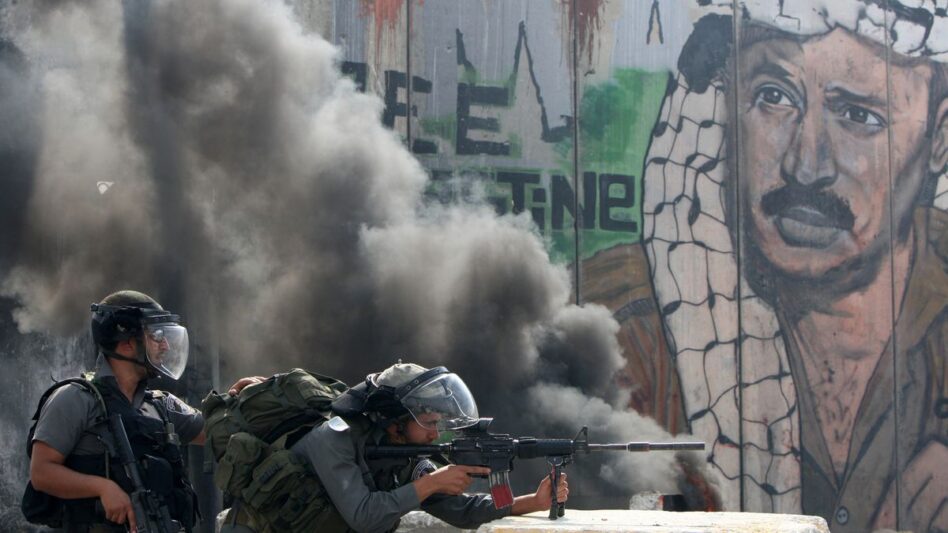THE Israel-Palestine conflict has been a longstanding and complex issue that has garnered significant attention and debate within the international community.
The conflict stems from the competing claims and aspirations of both the Israeli and Palestinian people over the same land, particularly in the region of historic Palestine.
There have been numerous endeavors undertaken to seek a resolution to the aforementioned conflict, yielding varying levels of achievement. Regrettably, the conflict remains unresolved, resulting in the victimisation of innocent individuals, particularly children and women.
This predicament persists primarily due to the abundance of oil and gas resources in the Middle East region, which engenders vested interests among the involved parties, thereby perpetuating the enduring nature of this unresolved conflict.
According to a report by the United Nations (UN), more than 250,000 individuals have been subjected to forced displacement from their residences in Gaza as a direct outcome of the persistent bombardment executed by the Israeli military.
Additionally, the report highlights that the recent bombings have caused the demolition of over 1,000 housing units.

The current fatality count in Israel has escalated to 1,200, with a corresponding toll of over 900 casualties in Gaza.
In the wake of an unparalleled offensive initiated by Hamas, the Israeli armed forces have persisted in their offensive of Gaza, resulting in the demise of two prominent Hamas figures.
Bestowing to Mark Regev, a former Israeli ambassador to the UK, Hamas has been identified as the instigator of the ongoing conflict, as reported by the BBC.
Furthermore, Regev confidently stated that Israel will ultimately bring this war to a resolution, and it will be accomplished in accordance with their own terms and conditions.
This particular approach is unlikely to facilitate an amicable resolution between the involved parties, thereby perpetuating the conflict indefinitely.
Such a prolonged state of conflict would have adverse consequences, particularly for the civilian population, with a heightened impact on women and children.
Josep Borrell, the European Union’s High Representative for Foreign Affairs, issued a statement expressing concern that Israel’s actions in Gaza may have already violated international law.
While acknowledging Israel’s right to self-defense, Borrell emphasised the importance of conducting such actions in accordance with international and humanitarian law. He criticised certain decisions made by Israel that contravene these legal frameworks.
Borrell also emphasised the necessity of continuing to provide financial support to the Palestinian Authority in light of the attacks carried out by Hamas against Israel.
Furthermore, Borrell stressed the need to consider the future and work towards a solution that will establish long-term peace in the region.
The UN Middle East peace envoy, Tor Wennesland, expressed grave concern over the current situation, describing it as a perilous precipice. He implored all parties involved to exercise restraint and refrain from escalating the conflict.
Volker Tuerk, the UN High Commissioner for Human Rights, highlighted the devastating impact of the attack on Israeli civilians. He emphasised that civilians should never be targeted in any form of aggression.

Antonio Guterres, the Secretary-General of the UN, expressed deep concern for the well-being of the civilian population and called for utmost restraint.
He stressed the importance of respecting and protecting civilians in accordance with international humanitarian law, as reiterated by UN spokesperson Stephane Dujarric.
Ahmed Aboul Gheit, the Arab League chief, called for an immediate cessation of military operations in Gaza and an end to the recurring cycle of armed confrontations between the two sides.
He further emphasised that Israel’s continued implementation of violent and extremist policies poses a significant threat to regional stability in the foreseeable future.
The United Nations Security Council (UNSC) convened in a closed-door emergency session a few days ago in response to the ongoing conflict between Israel and Gaza. However, the Council was unable to reach the required consensus for a collective statement.
In general, the majority of regional and international organisations have expressed their willingness to seek solutions to the ongoing conflict in order to achieve the best possible outcome.
However, the response of the UNSC has been deemed unsatisfactory. The indecisive stance of the UNSC on this issue highlights the inability of the highest body within the UN to fulfil its fundamental purpose for which it was established.
Therefore, it is imperative to expand the membership of the UNSC to include countries from Africa, Central and South America, in order to ensure that the world as a whole is represented in addressing delicate issues such as the Gaza-Palestine conflict, rather than being decided by victorious countries of World War II, which is now dysfunctional.
Prime Minister Datuk Seri Anwar Ibrahim has reaffirmed Malaysia’s unwavering commitment to stand in solidarity with the Palestinian people.
He also shared the government’s efforts in engaging in discussions with leaders from the Islamic world to identify the most effective solution for alleviating tensions in Palestine, thereby facilitating the delivery of humanitarian and medical aid.
During a recent parliamentary session, Deputy Prime Minister Datuk Seri Dr Ahmad Zahid Hamidi expressed Malaysia’s appeal to the UNSC to promptly intervene and encourage all parties involved to cease acts of violence amid the ongoing clashes between Israel and Hamas in and around the Gaza Strip.
He emphasised the necessity for the international community to exert increased pressure on all parties to take immediate action in order to bring an end to the conflict, thereby ensuring regional security and stability.
He also further asserted that Malaysia remains open and will continue to support concrete and practical efforts aimed at achieving a fair and lasting resolution to the Palestinian-Israeli conflict, in accordance with international legal provisions and UNSC resolutions.
In addition, he accentuated that the liberation of Palestinian territory and the protection of Palestinian rights will remain a central priority in the Malaysian government’s foreign policy.
Meanwhile, the Foreign Affairs Ministry has issued a statement expressing concern over the recent escalation in the Middle East, attributing the root cause to the prolonged illegal occupation, blockade, and suffering endured by the Palestinian people, as well as the desecration of Al-Aqsa and the politics of dispossession perpetuated by Israel as the occupying power.
The ministry called for a return to the pre-1967 borders and urged the UNSC to demand an immediate cessation of violence, as well as the respect and protection of innocent civilian lives.

In conclusion, Malaysia’s unwavering dedication and endorsement of the Palestinians’ right to self-determination is widely acknowledged and revered.
One proposed solution to the Israel-Palestine conflict is the two-state solution, which suggests the establishment of two separate and independent states for Israelis and Palestinians.
This solution aims to address the aspirations of both parties by allowing them to govern themselves and exercise their right to self-determination.
The two-state solution has been widely supported by the international community, including the UN, as a means to achieve a peaceful resolution to the conflict.
However, the implementation of the two-state solution has faced numerous challenges and obstacles. These include issues related to the delineation of borders, the status of Jerusalem, the right of return for Palestinian refugees, and the security concerns of both Israelis and Palestinians.
Additionally, the presence of Israeli settlements in the occupied territories has further complicated the prospects for a two-state solution.
Hence, it is imperious for the international community, particularly the UNSC, to undertake sincere measures aimed at facilitating a peaceful resolution by convening negotiations between the parties involved.
It is crucial that nations with vested interests in the Middle East region refrain from involvement, as their interference may exacerbate the conflict and prove detrimental to both sides.
However, it remains uncertain whether the international community genuinely desires a swift resolution to this conflict. – Oct 11, 2023
R.Paneir Selvam is the principal consultant of Arunachala Research & Consultancy Sdn Bhd (ARRESCON), a think tank specialising on strategic national and geo-political matters.
The views expressed are solely of the author and do not necessarily reflect those of Focus Malaysia.
Main pic credit: NDTV









